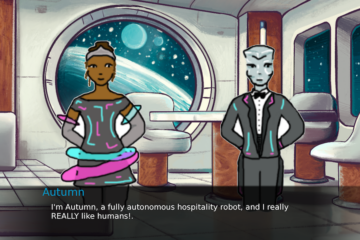When I was an unpublished, aspiring writer, oh lo those 15 years ago, I was soaking in desperation. I thought-screamed, “What do you want from me?!” over every rejection letter. If they’d only say, I could write it! I tried to come up with the Cool New Concept that would knock editorial socks off next time. It had to be that my ideas weren’t wild and new enough, right? I needed to get more unconventional! I bet they haven’t seen a second-person future tense story in the form of a series of blog posts? This week?
Oh, past me, oh no. NO. The answer was in front of me all along. I ignored it because it was boring.
I remember distinctly one story that went through my writer’s workshop, by one of the writers who had a steady, professional career. I’d just finished my “this is a tribute to John Ashbury and generation ships and the video game industry with a theme of how art enriches life and capitalistic employment robs it” story that everyone said was “formless” and this guy… he turns in a real dud, I thought. Vampire and vampire hunter kinda have a thing, vampire betrays vampire hunter, but ah ha, vampire hunter knew she would do that, so he had a trap set just for that, the end.
How “been done!” I thought. No way it’ll sell.
He sold it before the next workshop meeting.
At the time, baby-writer-me thought, “It’s his name. He’s an established author and editors will buy anything he throws together! It’s not fair!”
Baby-writer-me was wrong. I’ve sold fourteen pieces to Analog now, it doesn’t stop Trevor Quachri from sending me rejection letters.
The thing about that oh-so-ordinary vampire story was: it had structure. It was competent and complete. Yes, the ending felt expected — but that wasn’t the flaw I thought it was. A mystery must always end with the secret revealed. A romance must end with the couple happy together. The reader wants their expectations satisfied.
Convention WORKS.
No, I’m not saying “Abandon your ambitions! Sell out and write safe pablum!” though baby-writer-me would think of it that way. I’m still trying to sell second-person-future-tense stories about ineffable truths. The trick is, I’ve learned why conventional works, and how it works.
Every English teacher I’ve ever had said, “You have to learn the rules before you can break the rules,” and I said, “yeah yeah let me spend four seconds on this rule and then break it.”
I didn’t want to write the conventional story, I wanted to skip that practice. I had a vague idea how it worked, wasn’t that enough?
Turns out, no.
It’s frustrating to admit they’re right. You have to learn what structure is before you can break structure. You have to do the work of writing a conventional story to see how you can write an unconventional story… but it’s so hard not to skip ahead.
There’s a reason the montage is such a common movie trope – skill comes from long, boring practice. We don’t want to sit with Black Widow three nights a week for her three hours of strength training, we want to get to the part where she kicks butts. That’s fine if you’re just watching, but if you want to BE Black Widow, well, go pick up a pair of ten pounders, we’re starting with four sets of curls.
This is a journey. You gotta move each plodding foot in front of the next. The montage only comes as an afterthought.



